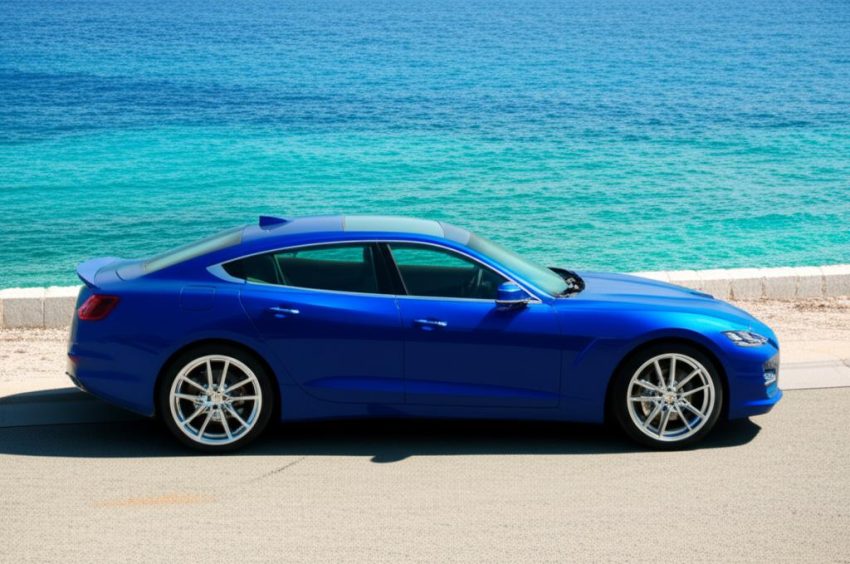Picture this: You’re cruising along the stunning coastal roads of Koh Samui, the sun glinting off the turquoise water, the wind in your hair. It’s paradise, right? But while you’re soaking up the beauty, your car’s paintwork is facing a relentless assault. The harsh tropical sun, salty sea air, sand kicked up by tires, stray gravel, bird droppings – the elements here are beautiful but brutal on your vehicle’s finish. Over time, that vibrant paint can fade, scratch, and lose its showroom shine, leaving your beloved ride looking tired and worn. How can you protect your investment and keep it looking its best, even in this challenging environment?

Let me tell you about a client, Khun Somchai, who lives on Phuket. He loved driving his new white SUV along the island’s scenic routes every weekend. Within a year, he started noticing tiny stone chips on the front bumper and hood, fine scratches from bushes along narrow roads, and a slight yellowing on the exposed surfaces due to the intense sun. He was heartbroken. He considered repainting, but that’s costly and affects the car’s original value. He tried waxing frequently, but it offered minimal protection against physical damage and the sun’s UV rays were still doing their work.
Khun Somchai came to us looking for a solution that would truly protect his paint without changing its look drastically. We recommended a high-quality Transparent TPU Paint Protection Film (PPF). He was initially hesitant about wrapping his brand-new car, but after seeing samples and understanding the technology, he decided to go for it. The installation process took a couple of days, involving meticulous cleaning, precise cutting of the film to match his car’s panels, and careful application to ensure no bubbles or imperfections. The film is virtually invisible once applied correctly.
The transformation wasn’t a change in colour, but a change in resilience. His SUV now had a robust, self-healing layer protecting its original white paint. Khun Somchai was amazed at how the film enhanced the gloss of his paint and made washing easier. More importantly, after months of driving on the same island roads, his paintwork remained flawless. No new chips, no scratches, and the colour stayed perfectly white. He told us, “It’s like having an invisible shield. I can enjoy driving without worrying about every little stone or branch. My car looks as new as the day I bought it.”

So, what exactly is TPU film, and why is it the superior choice for protecting your car in places like Thailand’s islands? TPU stands for Thermoplastic Polyurethane. It’s a high-performance plastic known for its elasticity, transparency, resistance to abrasion, chemicals, and temperature variations. Unlike older PVC-based films or standard vinyl wraps primarily used for colour change or graphics, TPU film is specifically engineered for paint protection.
Let’s break down the differences and benefits:
| Feature | TPU Paint Protection Film (PPF) | Standard Vinyl Wrap (Colour Change) | Ceramic Coating |
|---|---|---|---|
| Primary Function | Protect original paint from physical damage (chips, scratches), UV, stains, environmental fallout. Enhance gloss or provide a satin finish while protecting. | Change vehicle colour or apply graphics. Offers minimal protection against physical impacts. | Provide a hard, hydrophobic layer for chemical resistance, UV protection, and ease of cleaning. Minimal protection against physical impacts. |
| Material | High-grade Thermoplastic Polyurethane (TPU). Flexible, elastic, and often has self-healing properties. | Polyvinyl Chloride (PVC). Less flexible, can become brittle over time, prone to shrinking. | Liquid polymer that bonds to the paint surface, creating a hard layer (often SiO2 or TiO2 based). |
| Protection Level | Excellent against stone chips, scratches, scuffs, minor abrasions. Good against UV fading, bird droppings, insect acids, and road grime. | Minimal against physical impacts. Offers some UV protection and barrier against minor contaminants. | Excellent against chemical stains, etching from bird droppings/insects (if cleaned promptly), UV fading. Provides high hydrophobicity. Poor against stone chips and scratches. |
| Durability / Lifespan | Typically 5-10 years, depending on quality and maintenance. Resists yellowing and cracking. | Typically 3-7 years, depending on quality, finish (gloss/matte), and environmental exposure. Can fade, shrink, and crack over time. | Typically 1-5 years, depending on quality, layers applied, and maintenance. The protective layer wears down over time. |
| Self-Healing | Many high-quality TPU films have a top coat that can self-heal minor scratches and swirl marks when exposed to heat (sunlight or warm water). | Generally does not have self-healing properties. | Does not have self-healing properties for physical scratches on the paint layer itself. |
| Maintenance | Easy to wash. Requires specific detail sprays and sealants designed for PPF. Avoid harsh chemicals or abrasive polishes. | Easy to wash. Requires specific cleaning products. Can be damaged by harsh chemicals. | Very easy to wash due to hydrophobic properties. Requires specific maintenance washes and often booster sprays to maintain performance. |
| Removal | Removable without damaging original paint (if applied correctly and paint is factory original). | Removable, but older or lower-quality films can be difficult and may leave adhesive residue or even damage paint if not removed properly. | Requires machine polishing to remove the bonded layer. |
| Typical Cost (per vehicle) | Highest investment. Varies significantly based on vehicle size, film quality, and installer expertise. (e.g., ฿30,000 – ฿100,000+ for full front, ฿80,000 – ฿200,000+ for full car). | Moderate investment. Varies based on vehicle size, film type (standard colour, chrome, textured), and installer. (e.g., ฿30,000 – ฿80,000+ for full car). | Moderate investment. Varies based on package (number of layers, preparation work) and installer. (e.g., ฿10,000 – ฿50,000+). |
| Ideal User | Car owners who want the best possible protection for their original paint against physical damage and environmental factors, preserving resale value. Especially recommended for new cars or recently repainted vehicles in harsh environments like coastal areas. | Car owners who want to change their car’s appearance (colour/finish) temporarily or for styling purposes. Offers some basic protection but not the primary benefit. | Car owners who want excellent chemical resistance, UV protection, and ease of cleaning, and whose primary concern is not physical impact protection. Often applied over PPF for added hydrophobicity and gloss. |
As you can see, for robust protection against the unique challenges of Thai island driving – the flying sand, gravel, potential scratches from narrow roads, and intense sun – TPU film stands out. Its physical protection capabilities are unmatched by ceramic coatings, and its durability and protective features far exceed standard vinyl wraps.
Don’t just take my word for it. We’ve had numerous clients on the islands who were initially sceptical but became strong advocates for TPU film:
“Living in Koh Lanta, my pickup truck was always getting little nicks and scratches from the roads and parking areas. Since getting the full front PPF, it’s amazing. The paint underneath is perfect, and the film still looks brand new. Best money I’ve spent on the truck.” – Khun Panya, Lanta
“I drive a convertible in Samui, so it’s always exposed. The sun was my biggest worry, plus the salt air. The TPU film gave me peace of mind. My red paint hasn’t faded at all, and it’s much easier to clean off bird droppings before they stain.” – Khun Nuan, Samui
“I used to get my car polished constantly to remove swirl marks and fine scratches from washing. With the self-healing film, those minor marks just disappear in the sun. It saves me time and money on detailing, and my car always looks freshly polished.” – Khun Bancha, Phuket
Imagine the feeling of driving your car, knowing its paint is shielded by the best technology available. No more wincing at the sound of gravel hitting your bumper, no more worrying about parking under trees, no more stressing about the sun dulling your colour. Just pure enjoyment of the drive and the island scenery, with your car looking its absolute best for years to come.
Ready to give your car the ultimate protection it deserves against the Thai island elements? Want to learn more about the different types and brands of TPU film available and find the perfect fit for your vehicle and budget?
📱 Want to learn more about car wrap & paint protection?
Feel free to reach us on LINE:

🌐 Official Website: https://tpuwraps.com
We’re here to answer your questions and guide you through the process. Protecting your car’s paint is an investment that pays off by preserving its appearance, maintaining its value, and giving you peace of mind every time you hit the road.
Frequently Asked Questions about TPU Film (PPF)
- Q: How long does TPU film last?
- A: High-quality TPU films typically come with warranties ranging from 5 to 10 years against yellowing, cracking, peeling, and hazing. With proper care, the film can maintain its protective properties and appearance for this duration or even longer.
- Q: Will TPU film damage my car’s paint if removed?
- A: When applied correctly to factory original paint or professionally repainted surfaces that have fully cured, high-quality TPU film is designed to be safely removed without damaging the paint underneath. Removal should ideally be done by a trained professional.
- Q: How do I clean a car with TPU film?
- A: Cleaning is generally easier! The surface is smooth and often hydrophobic. Use a mild car wash soap and soft wash mitt. Avoid abrasive brushes, harsh chemicals, or pressure washers held too close to the film edges. Regular washing is recommended to prevent contaminants from sitting on the film.
- Q: Can TPU film cover existing scratches or damage?
- A: TPU film is best applied to paintwork that is in excellent condition. While it can slightly mask very fine swirl marks, it will not hide deep scratches, chips, or other damage. Any existing imperfections will be sealed underneath the film and may be visible. It is highly recommended to correct paint imperfections before applying PPF.
- Q: Is TPU film worth the cost?
- A: While the initial investment is higher than waxing or ceramic coating, TPU film provides a level of physical protection that these alternatives cannot match. For car owners who want to preserve their vehicle’s original paint condition, protect against common road hazards in environments like Thailand, and maintain resale value, many find the cost well justified over the lifespan of the film.
In conclusion, if you love driving your car on the beautiful but demanding roads of Thailand’s islands, protecting its paint should be a top priority. TPU Paint Protection Film offers an unparalleled level of defense against the unique challenges of this environment – sun, salt, sand, and debris. It’s an investment in your car’s longevity and appearance, ensuring it remains a source of pride and joy for years to come. Don’t let the elements steal your car’s shine. Give it the ultimate protection with TPU film.

